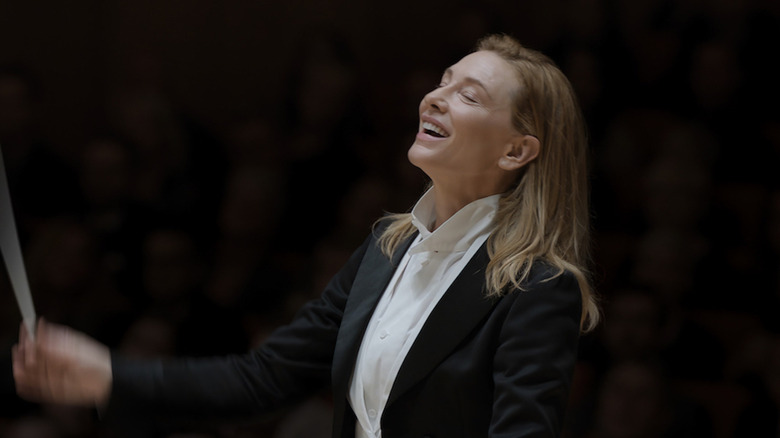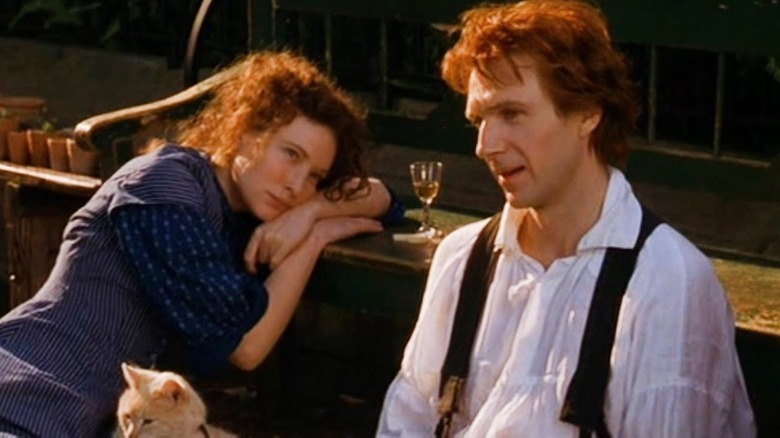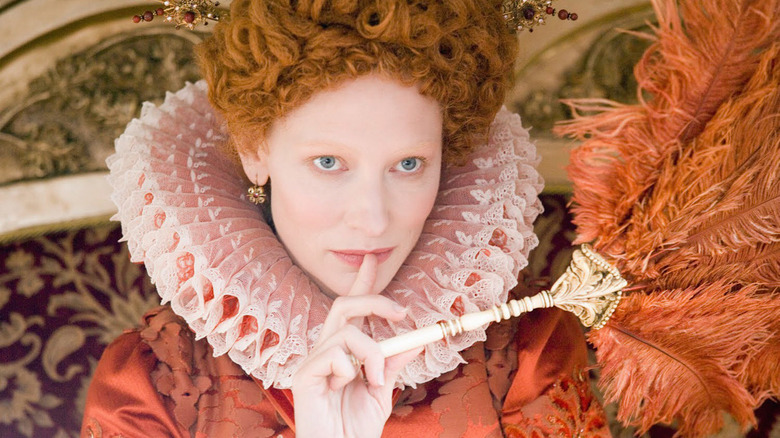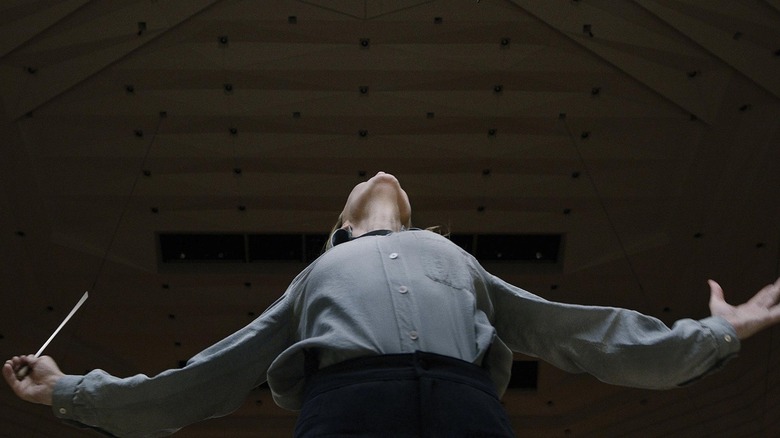Cate Blanchett Is The Best Actor Ever
The clichéd view of genius-level artists dictates that brilliance comes with the heaviest of tolls. The greats, the pioneers — these people are tortured from the crib and grow up unloved or abused. Some can feign happiness, but, deep down, they're driven by grievance and frequently undone by inner demons. Worst case, they bounce from marriage to marriage and neglect their children, who subsequently hate them and wind up writing a tell-all memoir. Best case, they're miserable jerks who can't enjoy the riches and plaudits bestowed upon them.
Except for Cate Blanchett. If everything I've read about Blanchett is to be trusted, the two-time Academy Award-winning actor is an absolute joy to work with and know. She is completely unguarded in interviews. There is no mystery to her. She is, by her own admission, a happily married mother of four whose greatest personal tragedy is that she cannot carve out the time to read Marcel Proust's "In Search of Lost Time." There's been nary a scandal, and no stint in rehab. Maybe there's a Richard Cory twist coming, but having followed her 26-year feature film career very closely, I feel like I can safely say that I wish I could be Cate Blanchett.
Read her fascinating 2019 chat with Julia Roberts for Interview, and you'll discover an eloquent artist with the healthiest of perspectives on her career. She doesn't seem to look too far ahead. Indeed, she's always wondering if the film or play she's working on right this moment should be her swan song. Proust, after all, is calling — but, evidently, he's not calling forcefully enough. Her work and restless curiosity keep her driving ever forward. It's been this way since 1997, when she exploded from out of nowhere to announce herself as one of our greatest living actors.
The breakout
If you're looking to get into the movies of Australian New Wave director Gillian Armstrong, do not start with "Oscar and Lucinda." Reach back to her 1979 feature filmmaking debut, "My Brilliant Career," an exhilarating feminist work in which a determined young author (Judy Davis) refuses to accept the misogynistic expectations thrust upon her from birth. We've seen this story before, but Armstrong and Davis imbue it with a prickly passion that would mark Armstrong's best work prior to her 1997 movie about two compulsive gamblers undone by the most peculiar of wagers.
In "Oscar and Lucinda," Davis was initially supposed to play the role of Lucinda, a wealthy heiress obsessed with glass-making. She's drawn to Oscar (Ralph Fiennes), an Anglican minister who shares her love of gambling, and ultimately commits to a bet over the delivery of a glass cathedral from Sydney to a difficult-to-access area of Australia. The film is an interesting companion piece to "My Brilliant Career," particularly in its portrayal of Oscar, who, quite unlike Sam Neill's suave charmer in Armstrong's earlier movie, is a bundle of nerves. Had Davis played Lucinda in '97, she would've eaten the jittery Fiennes for lunch in every scene. We would've expected it because Davis, who'd been nominated for two Academy Awards by this point, could do this role in her sleep.
Cate Blanchett, however, was a completely unknown quantity outside of Australia before she took over the role. Her Lucinda is stirringly confident dealing cards and taking money from men, to the extent that it could be difficult to understand what she sees in Oscar. But we had no point of reference for Blanchett. I hadn't read the book prior to seeing the movie, so I didn't know if Lucinda was a bunch of bluster or every bit as steely as she seems. Her truth lies somewhere in the middle, but, even though the narrative is disappointingly predictable, we never get ahead of Blanchett. Scene to scene, she's all surprises. The film ultimately fails her, but the few of us who saw the film theatrically walked out knowing we'd seen someone special.
The career
There's nothing more thrilling for moviegoers than buying a ticket for a random film on a whim, and discovering what appears to be a generational talent. You can't make that call based on one movie because you can't predict how people will handle the pressure of making good on their initial triumph. Roger Ebert had Sylvester Stallone tagged as the next Marlon Brando after "Rocky." M. Night Shyamalan was anointed as the next Spielberg following the blockbuster hat trick of "The Sixth Sense," "Unbreakable" and "Signs." Artists are human. People stumble, and sometimes they don't get back up.
Cate Blanchett is made of the sternest stuff. This became startling clear with her powerhouse portrayal of Queen Elizabeth I in Shekhar Kapur's "Elizabeth." As a monarch who bucks tradition and forms her own identity on her own terms, Blanchett rose above tepidly written material and earned her first Academy Award nomination for Best Actress. Anyone still doubting her talent or range ate a heapin' helpin' of crow the following year when she gave three wildly different performances in "An Ideal Husband," "Pushing Tin" and "The Talented Mr. Ripley" (for which she received Oscar nomination number two). One year after that, her accent work proved impeccable in Sam Raimi's Southern-fried supernatural corker "The Gift," where she played a Georgia clairvoyant who believes a disappeared woman has been murdered by her husband.
Blanchett's brilliance isn't up for debate, so let's take a moment to appreciate her prolificness. Since 2000, only two years have gone by without a new Blanchett movie. Factor in her stage and television roles, and the sheer volume of her work is staggering. And, oh, the variety! Romantic leads, femme fatales, social misfits, political dissidents, Bob Dylan ... is there anything she can't do?
And is there anyone else who could've played Lydia Tár? Todd Field sure doesn't think so.
The defining performance
Todd Field's slithery character study about a brilliant conductor/composer destroyed by her ruthless treatment of peers who could never touch her genius is, appropriately, unimaginable without Cate Blanchett at its fiery, frustrating center. He wrote it for the star, and has said repeatedly that he would've scrapped the project altogether had she turned it down.
Tár is something of a post-#MeToo Rorschach blot. She is a genius who came from a blue-collar Staten Island home and contemptuously reinvented herself. She is laser-focused on excellence. She demands it from her charges at the Berlin Philharmonic, and, during a Juilliard master class, ridicules a BIPOC student for brashly shrugging off the entirety of J.S. Bach's oeuvre because he finds the composer personally problematic. For Tár, how you behave in your private life has no bearing on the work. The art is all that matters.
Tár lives by this creed, and has excused her many abuses of power by virtue of her talent. She lives on a higher frequency than other people. She suffers from misophonia, meaning she's unnerved by ambient sound. The character's rhetorical grandstanding and hideous public breakdown are Oscar-clip worthy, but it's Blanchett's subtle expressions of discomfort to the rattle of the world around her that allows us to get on Tár's wavelength.
Tár is as unlikable as Blanchett is lovable in interviews. The character is an investigation of the tortured-artist cliché, which exists because it is, on some level, true. Being a genius doesn't give you license to be a monster, but some people burrow so deep into their art that they can't see the harm they're inflicting on others. It took an artist as compassionate as Blanchett to portray this penchant with piercing empathy. God, is she ever a gift.



